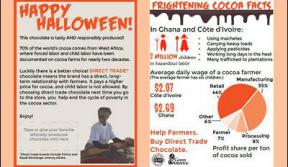Children who work on cocoa plantations are exposed to hazards such as dangerous tools, dust, flames or smoke, chemicals, and/or physically demanding labor such as carrying heavy loads or spending many hours in the sun.
Cocoa trees are grown on small, independent farms of fewer than 5 hectares. Small farm sizes in the cocoa industry mean that production is heavily decentralized among hundreds of thousands of farmers. It is estimated that there are over 4.5 million small scale cocoa producers worldwide. These producers are scattered about the globe, but are generally located within 20 degrees of the equator, where the climate is most suitable for the crop. Altogether, producers across the globe supply 4 million tons of cocoa beans annually, and Ghana and Cote D’Ivoire now produce 70% of the world’s cocoa supply.
Unfortunately, the cocoa sector in this region is also afflicted with a severe child labor problem. In 2009, the U.S. Department of State estimated that there were more than 109,000 children working in the “worst forms of child labor” in Cote d’Ivoire’s cocoa industry, and about 10 percent of those were victims of human trafficking or forced labor. In Ghana, the U.S. Department of Labor estimated in 2010 that about 43.5% of Ghanaian children aged 5-14 years were working.
Children who work on cocoa plantations are unavoidably exposed to certain hazards, including dangerous tools, dust, flames or smoke, hazardous chemicals, and/or physically demanding labor such as carrying heavy loads or spending many hours in the sun.
In addition to the physical consequences of their labor, cocoa farming often interferes with children’s education. In Ghana, only about 75% of children attend school. In Cote d’Ivoire the problem is even more severe: only 59% of young boys attend school, while only 51% of girls are in school. The consequences of being unable to attend school follow these children throughout their life, leading to an endless cycle of poverty.
Ultimately, the root cause of the child labor problem in West Africa is poverty. Cocoa farmers receive below-poverty incomes from their participation in the cocoa industry. It is estimated that in order to even meet the poverty line, cocoa farmers would have to earn more than three times their current income.


